Personality Traits and Attitude toward Corruption among Government Workers
Damilare A Fagbenro1*, Adekunle A Kenku2 and Mathew O Olasupo1
1Department of Psychology, Obafemi Awolowo University, Ile-Ife, Osun State, Nigeria
2Department of Psychology, Nassarawa State University, Nassarawa State, Nigeria
Submission: January 31, 2019; Published: March 12, 2019
*Corresponding author: Damilare A Fagbenro, Department of Psychology, Obafemi Awolowo University, Ile-Ife, Osun State, Nigeria
How to cite this article:Damilare A Fagbenro, Adekunle A Kenku, Mathew O Olasupo. Personality Traits and Attitude toward Corruption among Government Workers. Psychol Behav Sci Int J. 2019; 11(1): 555801. DOI: 10.19080/PBSIJ.2019.11.555801
Abstract
Corruption in Nigeria has been so endemic especially among government agencies which civil servants sector is really affected with this menace. It therefore becomes important to investigate the influence of personality on attitude toward corruption among civil servants. Using a descriptive survey research design, data were collected from 300 civil servants in two purposively selected local government namely Lagos island local government and Etiosa local government all situated in Lagos state. Their age ranged between 25 to 61 years (mean age = 32 years, SD = 4.16). Data was collected using two standardized psychological scales which was analyzed using Pearson moment correlation. Results showed that there is significant positive relationship between extroversion and attitude towards corruption (r= .48, df = 298, p<.01). Positive relationship between openness to experience and attitude towards corruption (r= .49, df = 298, p<.01). Significant inverse relationship between conscientiousness and attitude towards corruption (r= -.45, df = 298, p<.01). Positive relationship between agreeableness and attitude towards corruption (r= .43, df = 298, p<.01). Positive relationship between neuroticism and attitude towards corruption (r= .51, df = 298, p<.01). It is therefore recommended that psychologists should help develop personality assessment tools for new and old employees such that it could help screen and detect employees who have a favorable attitude toward corruption, and they can be helped to reengineer this behavior.
Introduction
Corruption has continued to be a menace that has eaten deep both in developed and developing nation of the world. Ugwoegbu [1] define corruption as the illegal, immoral or dishonest behavior. This type of behaviour is mainly related to people in positions of power. It is a reality to say that corruption is more severe and persistent in developing country such as Nigeria. Over the years, the transparency international annual corruption perception Index has consistently rate Nigeria has one of the most corrupt country in the world. In Nigeria, corruption manifests itself in a variety of ways and in all sectors from the social, political and bureaucratic to the educational and cultural. Corruption are perpetrated in a variety of ways which include embezzlement, inflation of contracts, fraud, manipulation or distortion of information by public officials positioned between politicians and citizens [2,3], extortion, and lastly favoritism. These corrupt practices have continued to have negative implication on the socio-economic landscape of Nigeria such that more than half of the population now leaves on less than US $1 a day [4]. The government in a bid to reduce the menace of corruption in Nigeria created the anti-corruption agencies such as the Economic Financial crime commission (EFCC) and Independent Corruption and other Practices Commission (ICPC). Although the agencies recorded some achievable, the menace of corruption is still very high especially among public sectors.
In Nigeria employees in the public sector have been persistently alleged with corrupt practices ranging from fraud, embezzlement, bribery of judicial officials to monumental financial scandals. Attitude on the other hand, refers to people’s experience which can be positive or negative. It is positive when a person develops a strong attraction of his likes, situation, object, or other persons or groups. While it is negative when the person develops a strong dislike for situations, objects, persons, groups or other identifiable aspect of our environment. While some employee in the public sector will engage in corrupt practices, some will not engage in this act it therefore means that employees in the public sectors hold different attitude toward corruption. Many available studies have investigated many factors that influence attitude toward corruption such as personality, fraudulent intent, Need for achievement and Fear of crime [5].
Many available studies have investigated many factors that influence attitude toward corruption such as personality, fraudulent intent, Need for achievement and Fear of crime [5], gender and organizational factors [6]. Situational and personality predictors [7]. However, little or no study has investigated the influence of personality traits on attitude toward corruption especially among Civil servants in Lagos state, Nigeria. Hence a gap this research hopes to fill.
Personality traits has propensity to explain individual differences in such a way that it focuses on constructing a coherent image of the person and his or her major psychological processes. Personality can be defined as a dynamic and organized set of characteristics possessed by a person that uniquely influences his or her cognitions, motivations, and behaviours in various situations [8]. The big five frameworks are hierarchical model of personality traits with five broad factors, which represent personality at the broadest level of abstraction. It consists of neuroticism, extraversion, openness to experience, conscientiousness and agreeableness variables [9]. Extraversion includes the outward turning of psychic energy toward the external world. Individuals can either be high or low on these traits. Agreeableness is the trait that is most concerned with interpersonal relationships and refers to the kinds of interactions a person prefers [10]. On the other hand, individuals who score low on agreeableness tend to be rude, irritable, uncooperative, and suspicious, tending to cater for their own needs [11]. Conscientiousness represents the drive to accomplish something, including features such as high levels of thoughtfulness, good impulse control, and goal directed behaviour [12].
Neuroticism refers to a continual level of emotional adjustment and instability. Individuals who score high on the neuroticism trait tend to experience emotional instability, anxiety, moodiness, and irritability, and are inclined to be worrying, insecure, and nervous. Openness to experience involves actively seeking and appreciating new experiences [10] and has also been referred to as imagination or intellect [13]. Individuals who score high on openness to experience tend to be curious, seek new and unfamiliar experiences, have a broad range of interests, and are easily bored [11]. The personality traits an individual have could go a long way to determine the kind of attitude the person will have toward corruption. It is from this basis that this study examines the role of personality traits on attitude toward corruption among civil servants in Lagos state.
Empirical Review
Adejuwon (2010) examined personality, fear of crime, fraudulent intent and need for achievement on attitude toward corruption among 600 local government civil servants in Osun state. The study found that there was significant relationship between personality, fraudulent intent and Attitude toward corruption. Fear of crime had an inverse relationship with Attitude toward corruption. Personality was the most potent predictor of Attitude toward corruption which extroversion traits was really associated with attitude toward corruption. Gbadamosi [14] investigates 1833 respondents in Nigeria on personality trait, bribery intent, religion status on attitude toward corruption. The result showed that attitude towards corruption was significantly and positively correlated with respondent personality, but there is no relationship between attitude toward corruption and their religion belief. Attitude towards corruption was also inversely and significantly correlated with rate of bribery and corruption and religion.
Afolabi [15] carry out a study on influence of personality type (A and B) on attitude toward corruption of Nigerian police. The sample used consisted of one hundred and twenty two policemen and women whose ranks are from Constable to Assistant Superintendent of police in the Irrua Area Command, Edo State, Nigeria. They found that type A personality are more prone to have positive attitude toward corruption because they are always in a hurried, risk takers, rigid and inflexible. While type B persons have negative attitude toward corruption because they are supportive of others, open to criticism and they try to make others feel accepted, type B personality always view behaviour to be in an ethical way. Kirkcaldy [16] in their study show that in a sample of 332 managers, they found that type A personality and an external locus of control are associated with greater perceived attitude toward corruption compare with managers with a type B personality and an internal locus of control with negative attitude toward corruption. Almlund, et al. [17] in their work stated that, few studies have examined the relationship between the Big Five and attitude toward criminal behaviour and that available evidence suggests that Big Five Conscientiousness and Agreeableness is important protective factors against criminal activity as well as the Juvenile Delinquency. These traits in turn are the crime factor is based on arrest for selling or buying drugs, shoplifting, driving while drunk, perjury, forging checks, and vandalizing. Heckman, et al. [18] found that personality traits i.e openness to experience is relatively more important in predicting fraudulent behaviour among workers.
Gbadamosi & Bello [19] examined 150 workers in a company and they found the possibility of a variety of factors to predict attitudes to corruption. Similarly, workers with high scores in Need for Achievement (N-Ach) and personality have been found to be characterized by a tendency to seek challenges and a high degree of been involve in positive attitude toward corruption. Moorthy et al. [20] examined the influence of individual variables on employee attitude toward corruption and theft behaviour in a supermarket in Malaysia. Stratified random sampling technique has been used in the selection of respondents. The result revealed that personality influence attitude toward corruption. Based on the empirical studies the study hypothesizes that
i. Extroversion will have significant positive relationship on attitude toward corruption among civil servants in Lagos state.
ii. Openness to experience will have significant positive relationship on attitude toward corruption among civil servants in Lagos state.
iii. Conscientiousness will have positive influence on attitude toward corruption among civil servants in Lagos state.
iv. Agreeableness will have significant positive influence on attitude toward corruption among civil servants in Lagos state.
v. Psychoticism will have significant positive influence on attitude toward corruption among civil servants in Lagos state.
Methodology
Design
This study was conducted using cross-sectional survey research design. The independent variable used in this study is personality while the dependent variable is attitude toward corruption.
Setting
This study was carried out among civil servants in Lagos island local government and Etiosa local government all situated in Lagos state. The reason why this two local government was sampled is that there are persistent allegations of corrupt practices by government staffs in Lagos state; hence this research is important to test empirically with this two local government.
Sample and Sampling Technique
The study makes use of three hundred respondents (300). Purposive sampling techniques were used in gathering the data of this study. The reason why purposive sampling was used is that the researcher already has some knowledge of the population and the purpose of the study.
Participants
Participants’ ages ranged between 25- 30 years are 94 (31.3%), 31-35 years are 108 (36.0%), 36-40 years are 73 (24.3%), and 41 years and above are 25 (8.3%). 5 Their gender revealed that 168 (56.0%) were males while 132 (44.0%) were females. respondent’s marital status revealed that 144(48.0%) are single, 115(38.3%) are married, and 34(11.3%) are divorced and 7(2.3%) are widow. Finally, Civil servants educational attainment reveal that 83(27.7%) have OND, 71(23.7%) have HND, and 94(31.3%) have B.Sc.
Instrument
A standardized questionnaire was administered in order to document the bio-data of the participants which include age, gender, marital status etc. The questionnaire further included an attitude toward corruption scale and personality traits scale.
Attitude toward Corruption Scale
This consists of 20 items that measure attitude toward corruption which was developed by Gbadamosi & Bello [19]. Sample of the item reads ‚’Bribes and tips are expected in daily life in this country and ‚’Lack of sanctions for corrupt practices is likely to increase corruption’’ It was scored in Likert Format ranging from 1 = Strongly Disagree 2 = Disagree 3 = neither agree nor Disagree 4 = Agree 5 = Strongly Agree. The author reports a reliability of 0.62 for this scale and Cronbach’s Alpha of 0.91 was reported in this study for this scale.
Personality Traits Scale
Personality trait was measured with a 44-item BFI big five model of personality traits developed by John and Srivastava (1999). This scale has five subscales namely: extraversion, Agreeableness, Conscientiousness, Neuroticism and Openness to experience. Item 1, 6R, 11, 16, 21R, 26, 31R, and 36 measured the sub domain of extraversion, item 2R, 7, 12R, 17, 22, 27R, 32, 37R, and 42 measured the dimension of Agreeableness, item 3, 8R, 13, 18R, 23R, 28, 33, 38, and 43R measured the domain of Conscientiousness, item 4, 9R, 14, 19, 24R, 29, 34R, and 39 measured Neuroticism, while 5, 10, 15, 20, 25, 30, 35R, 40, 41R, and 44 measured Openness to experience. The scale has a response format of 5-point scale ranging from 1- disagree strongly, 2- disagree a little, 3- neither agree nor disagree, 4- agree a little, and 5- agree strongly. Each item on the scale begins with the phrase ‘’I see myself as someone who’’. High scores on any of these traits mean high traits while low score on any traits indicate low trait. The author of the scale reports a Cronbach’s alpha for the overall BFI scale as 0.83. In this study .78 was reported for extraversion, 0.67 for openness to experience, 0.71 for Agreeableness, 0.61 for Neuroticism, and 0.87 for Conscientiousness.
Procedure
Introduction letter was obtained from the Department of Psychology, Obafemi Awolowo University introducing the researcher to the study settings. Thereafter, the researcher got permission from the Head of Departments/staff in the two local governments area visited for the study. Respondents were thereafter educated on the purpose and objectives of the study. They were also informed that participation in the study was voluntary and that they are free to withdraw from the study whenever they felt uncomfortable to continue with the study. The participants were also given assurance of confidentiality in their responses. The questionnaire was distributed to the participants during the close of work, majority of the respondents return the questionnaire on a later day as only few of the residents fill the questionnaires on the spot. The filled questionnaires were retrieved and subjected to appropriate statistical analysis.
Results
Hypothesis One:
The Table 1 shows that there was significant positive relationship between extroversion and attitude towards corruption (r= .48, df = 298, p<.01). This suggests that increase in extroversion significantly relate to increase in attitude towards corruption among civil servants in Lagos State
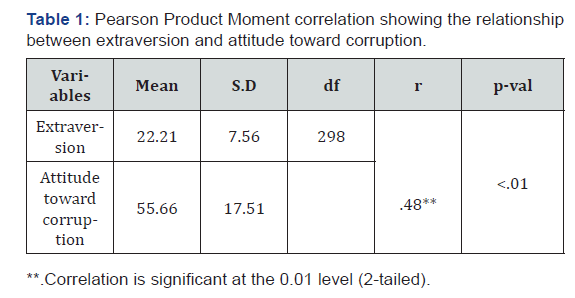
Hypothesis Two
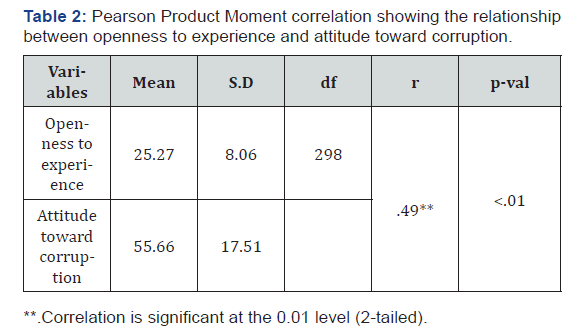
The Table 2 above shows that there was significant positive relationship between openness to experience and attitude towards corruption (r= .49, df = 298, p<.01). This indicates that increase in openness to experience significantly relate to increase in attitude towards corruption
Hypothesis Three
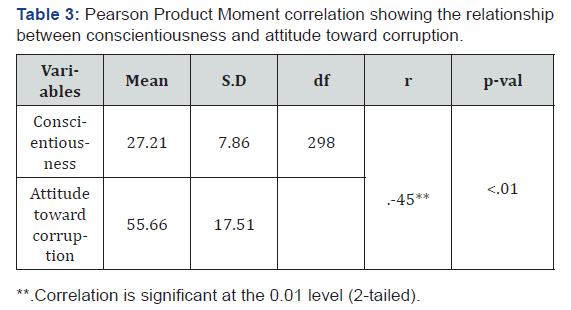
The Table 3 above shows that there was significant negative relationship between conscientiousness and attitude towards corruption (r=.-45, df = 298, p<.01). This indicates that increase in conscientiousness significantly relate to decrease in attitude towards corruption.
Hypothesis four
The Table 4 above shows that there was significant positive relationship between agreeableness and attitude towards corruption (r= .43, df = 298, p<.01). This indicates that increase in Agreeableness significantly relate to increase in attitude towards corruption.
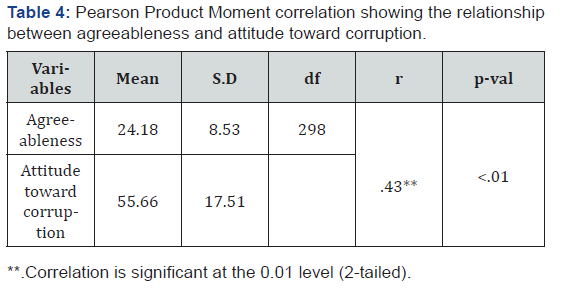
Hypothesis Five
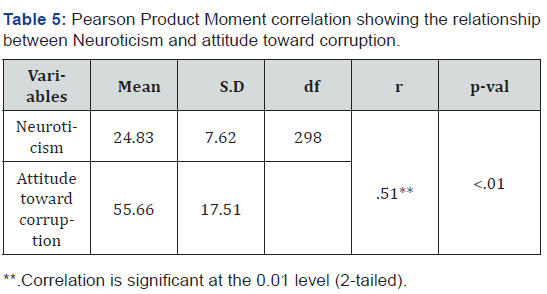
The Table 5 above shows that there was significant positive relationship between neuroticism and attitude towards corruption (r= .51, df = 298, p<.01). This indicates that increase in neuroticism significantly relate to increase in attitude towards corruption.
Discussion
The study examines personality traits on attitude toward corruption among civil servants. As predicted in hypothesis one there was significant positive relationship between extroversion and attitude towards corruption, this implies that increase in extroversion significantly relate to increase in attitude towards corruption. The study was in line with study done by Adejuwon (2010) who found that personality have significant relationship between personality where extroversion traits was really the most potent.
The second hypothesis found that there was significant positive relationship between openness to experience and attitude towards corruption, this means that increase in openness to experience leads to increase in attitude toward corruption. The study was in line with Heckman et al. [18] found that personality traits i.e. openness to experience are relatively more important in predicting criminal activity among workers. In another similar study done by Dror (1999) who found that factory workers who always want to get exposed to information’s at all-time reported having positive attitude toward been corrupt.
The third hypothesis found that there was significant negative relationship between conscientiousness and attitude towards corruption, this mean that increase in conscientiousness leads to decrease in attitude towards corruption. The study was in accordance with Heckman and Kautz [17] who found that Big Five personality traits especially Conscientiousness are important protective factors against corrupt practices. In another similar study done by Siollum [21] discovered from a self-report questionnaire that workers who don’t have a sense of conscience report been corrupt.
The fourth hypothesis found that there was significant positive relationship between agreeableness and attitude towards corruption. This implies that increase in agreeableness leads to attitude towards corruption. The study was similar with Dror and his colleagues (1999) found that individuals who have agreeableness traits are more prone to agree with other on corrupt practices thereby making them have a positive attitude toward corruption. In another similar study done by Tarasulo, (2009) found that government staffs who don’t have passion of what they are doing for the government report that they can engage in corruption any time they perceive they are not getting enough reward.
The fifth hypothesis found that there was significant positive relationship between neuroticism and attitude towards corruption; this means that increase in neuroticism lead to increase in attitude toward corruption. The study was in line with Moorthy, et al. [20] who found among Malaysia workers that the most potent predictors of personality that make individuals have positive attitude toward corruption is their emotional stability or neuroticism. In a similar study done by Collier, (1999) found that workers who are not comfortable with their salary and cannot cope with the rigor of the work load report that positive attitude toward corruption.
Conclusion
The study has been able to add to paucity of literature on attitude toward corruption. It was concluded in this study that extraversion have a significant positive relationship with attitude towards corruption, there was significant positive relationship between openness to experience and attitude towards corruption, there was also significant negative relationship between conscientiousness and attitude towards corruption, furthermore, there was significant positive relationship between agreeableness and attitude towards corruption. Finally, there was significant positive relationship between neuroticism and attitude towards corruption.
Implication and Recommendations
The study finding has practical implications on the role that personality traits have in the formation of attitude toward corruption. This study has implications for industrial and organizational psychologist as well as government at all levels. For industrial and organizational psychologists, they should devoid a psychological intervention programme aimed at reducing corruption in the public sector. Government at all levels should also devoid strategic means in which corruption would be reduce to its barest minimum in the public sector. It is therefore recommended that in order to reengineer behavior in the public sector in Nigeria, industrial and organizational psychologists should develop a personality assessment test aimed at screening both new and old employees who have favorable attitude toward corruption. Government at all levels should organize workshop and seminars for civil servants on the negative and detrimental effect of corruption in the public sector.
Limitation and Future Study
The first limitation of this study is generalization of the result findings to other civil servants in Nigeria since the study uses only two local governments. Another limitation encountered by this study is the issue of social desirability effect; most workers fake their response due to the sensitivity of the subject matter. Time constraint was a major challenge in this study. In order to ameliorate this limitation future study should increase the setting of the study as well as participant in order to improve the generalization of the result findings. Future study should also consider enough time for this kind of study.
References
- Ugwoegbu I (2012) Roles of Adult Education in Minimizing Corruption in Nigeria. Journal of Emerging Trends in Educational Research and Policy Studies (JETERAPS) 3 (2): 170-173.
- Eskeland GA, Thiele H (1999) Corruption under moral hazard. Seminar for Theoretical Economics World Bank Policy Research Working Paper No 2204.
- Fjeldstad OH (1999) Combating corruption: a transparency index for donors? Development Today 9(6): 56-78.
- G-Nexid (2009) Brief Profile: Nigeria.
- Adejumo AO (2009) Introduction to Psycho-biological basis of behavior. University of Ibadan Press: Ibadan, Nigeria.
- Fagbohungbe B, Akinbode A, Ayodeji A (2012) Gender and organizational factors as determinants of workplace fraudulent behaviours in Nigeria: An Empirical Analysis. International Journal of Business Trends and Technology 2I(2): 11-21.
- Alarape AI (2004) Situational and personality predictors of fraudulent intent of bank employees. In: Western Nigeria. Ph.D. thesis, University of Ibadan, Ibadan, Nigeria.
- Luthan A (2005) Coping with interpersonal stress: role of big five personality traits. J Pers 73(5): 1141-1180.
- Gosling SD, Rentfrow PJ, Swann WB (2003) A very brief Measure of the Big-Five personality domains. Journal of Research in Personality 37: 504-528.
- Costa PT, Widiger RR (1994) Normal personality assessment in clinical practice.
- Edwards D (1998) Personality. In: Louw DA, Edwards DJ (Eds.) Psychology: An Introduction for Students in Southern Africa. Heinemann, Rivonia, South Africa 3: 541-603
- De Raad B (2000) The Big Five Personality Factors. A Psycholexical Approach to Personality. Hogrefe and Huber Publishers: Germany.
- Goldberg K, Johnson D, Eber T, Hogan Y, Cloninger O, et al. (2006) The search form universals in personality lexicons. In: L Wheeler (Ed.), Review of Personality and Social Psychology 2: 141-165.
- Gbadamosi G (2009) Money ethic, moral conduct and work related attitudes: field study from the public sector in Swaziland. Journal of Management Development 24(8): 754-763.
- Afolabi RE (2010) Role of personality type and attitude toward corruption in Nigeria. Garkida Press: Abuja, Nigeria.
- Kirkcaldy A (2002) El combate a la corrupció Reforma Banfield EC (1975). Corruption as a feature of governmental organization. Journal of Law and Economics 18: 587-605.
- Almlund M, Duckworth AL, Heckman JJ, Kautz T (2000) Personality psychology and economics. In: EA Hanushek, S Machin, L Wößmann (Eds.), Handbook of the economics of education, Elsevier: Amsterdam, Netherlands.
- Heckman K, Schennach P (2014) Personality traits and fraudulent behavior. Journal of behavior 3(4): 56-69
- Gbadamosi G, Bello M (2009) Profiling corruption perception in Africa: the role of religion, gender, education and age. In: N Delener, L Fuxman, FV Lu A Putnova, LE Rivera Solis (eds) Proceedings of the Business strategies and technological innovations for sustainable development: creating global prosperity for humanity conference, 2009, Prague. Prague: Global Business and Technology Association (GBATA): pp. 440-447.
- Moorthy SL, Somasundaram H, Nadarajah Y, Marimuthu Y (2011) A typology of deviant workplace behaviors: A multidimensional scaling study. Academy of Management Journal 13(2): 555-572.
- Siollum M (2009) Is corruption in the Nigerian DNA?






























